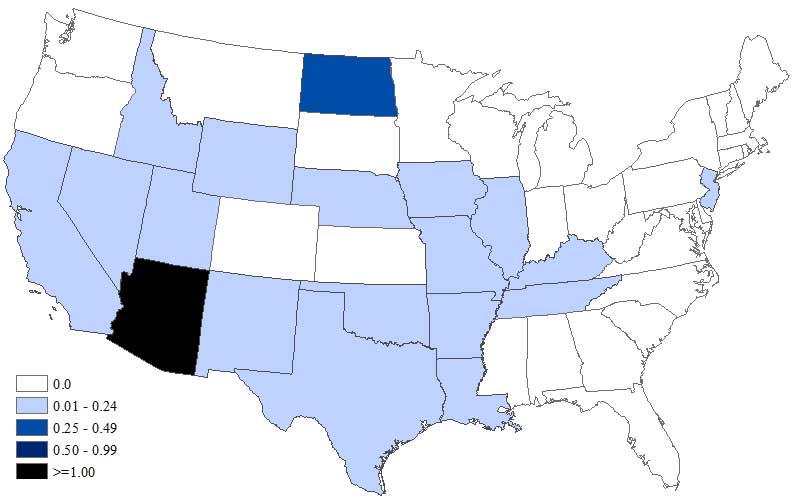Posted: 10/11/05
West Nile claims Rogers man
Riverview Community Bank
by Susan M.A. Larson
Staff writer
Eugene Lee, 76, Rogers, is believed to be Hennepin County’s first death due to West Nile virus (WNV). Lee died Sept. 29 at North Memorial Medical Center, Robbinsdale.
According to Doug Schultz, Minnesota Department of Health (MDH) spokesperson, it is not the MDH’s policy to release names, but he confirmed that a 76-year-old male from Hennepin County died from West Nile and “as far as we can tell from our records, we have had no other deaths in Hennepin County since we’ve had West Nile in the state in 2002.” Lee’s is the second West Nile death in Minnesota in 2005.
Jim Stark, public affairs coordinator for the Metropolitan Mosquito Control District (MMCD), said his department was notified by the Minne-sota Depart-ment of Health that a Rogers resident had been diagnosed with West Nile.The MMCD then looked for immature and adult mosquitos in Rogers.
“There needs to be a certain threshold of mosquitos (to spray for them) and the mosquito population (in Rogers) didn’t warrant any treatment,” said Stark.
Lee’s daughters, Wendy Lee and Jane Erickson, said their father didn’t really show any symptoms of illness. In mid-September, said Wendy, “He said he didn’t feel right. He went to an urgent care, but they didn’t find anything.”
On Sept. 21 he was to have left on a trip to Niagara Falls. But instead, Lee ended up in the hospital. Later that evening, he developed seizures, became unresponsive and had a fever of 104 that couldn’t be controlled. On Sept. 27, according to his daughters, they were told their father had West Nile, which turned into encephalitis. According to the Minnesota Department of Health, a small percentage of people infected with the West Nile virus, especially the elderly, develop encephalitis (inflammation of the brain); approximately 10 percent of these encephalitis cases are fatal. However, most people infected with the West Nile virus have either no symptoms or a very mild illness. Lee also had diabetes and a heart condition.
The typical incubation period for West Nile, the MDH reports, is two–six days, although it can be as long as 15 days. Most people infected with West Nile virus will be asymptomatic or experience a flu-like illness; 20 percent of those bitten by an infected mosquito will develop the symptoms of West Nile fever and one out of 150 people bitten by an infected mosquito will develop the more severe form of West Nile, West Nile encephalitis.
Erickson and Lee stress that they don’t want to be alarmists, but “it happens and people need to be able to take precautions,” said Erickson.
“But we don’t want them hiding in their houses,” Lee added.
“We don’t want people to hibernate, just take precautions,” said Erickson.
West Nile virus (WNV) is maintained in a transmission cycle involving one or more species of mosquitoes and birds.The MDH recommends personal protection measures such as use of mosquito repellents, avoiding outdoor exposures at dusk and dawn (peak feeding time for many mosquitoes), and wearing long-sleeved shirts and long pants to reduce the risk of West Nile. Removal of water-holding containers (mosquito breeding sites) from residential areas will reduce mosquito numbers.
Erickson and Lee remember their father as loving travel, being outdoors and genealogy.
News Clips and Information on West Nile Virus Survivors. Videos and links to News Articles on West Nile Virus Families, West Nile Deaths, West Nile Virus Prevention and West Nile Virus Symptoms
Friday, October 14, 2005
Subscribe to:
Post Comments (Atom)
CDC West Nile Virus Info
Skip directly to page options Skip directly to A-Z link West Nile Virus Neuroinvasive Disease Incidence by State 2019 West Nil...

-
Teenage girl in Menifee dies after four-year battle with West Nile illness Download story podcast 10:00 PM PST on Wednesday, December 10...
-
Skip directly to page options Skip directly to A-Z link West Nile Virus Neuroinvasive Disease Incidence by State 2019 West Nil...
-
Tosa man battling West Nile dies Steiner was principal of Wauwatosa West High School By KAWANZA NEWSON knewson@journalsentinel.com Posted: N...

No comments:
Post a Comment